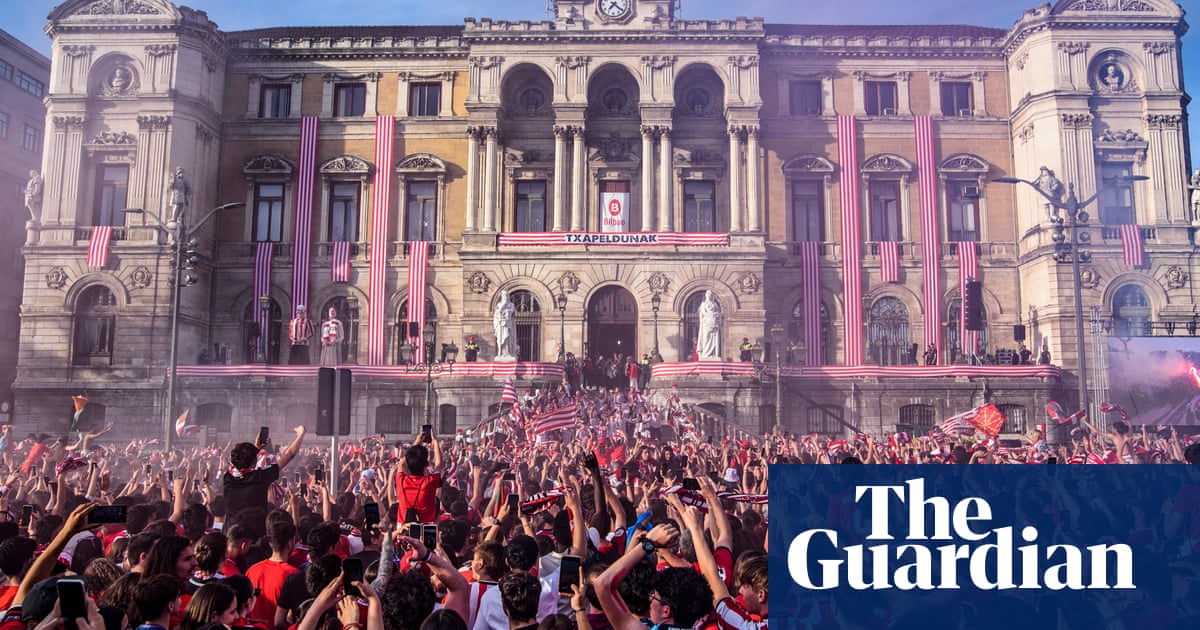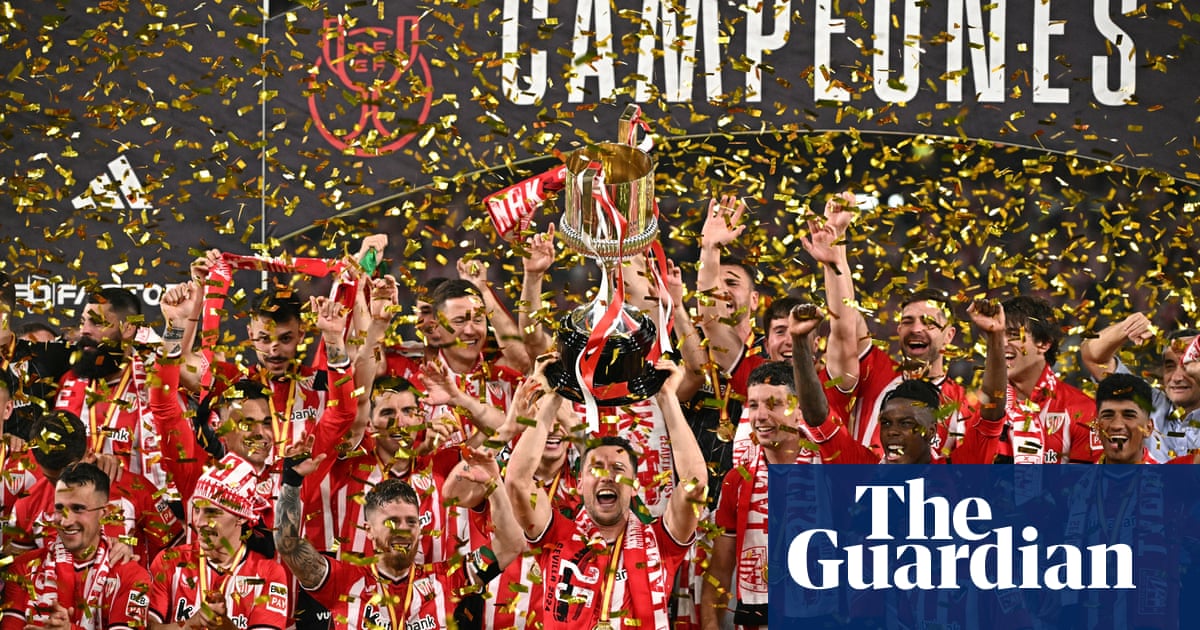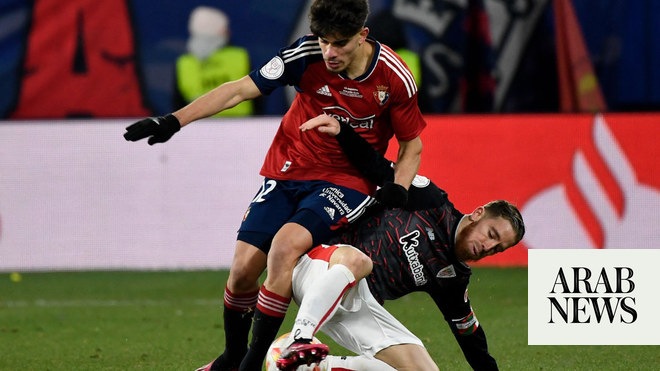
They had been down to Seville 907km away, 100,000 of them, and come back with their first major honour in 40 years, finally won well after midnight. They had made a victory parade of the traffic jam home, the Roman road known as the Silver Route turned red and white. And they had taken the trophy to the tree of Gernika, symbol of their people. There was the impromptu street party, a police fine imposed for the mobile disco heading through the old town, the whole band playing, and the gabarra, which is only a barge but is everything: a river cruise they had longed for. Then there were the six-hour queues to see the Copa del Rey, if only to check this was real.
For seven days they had celebrated. And on the eighth day there was just one thing left for Athletic Club to do, the perfect close to the week of their lives: bring everyone back to San Mamés, bring the Copa del Rey too, and beat Villarreal. After 40 years waiting, six final defeats – 1985, 2009, 2012, 2015, 2020, 2021 – it was just right. Even the man supposed to mess it up for them said so. Marcelino García Toral, the visiting coach on Sunday night and Athletic’s manager when they lost the last two of those finals, thanked “destiny” for the chance to be there. “I know what this means,” he said.
It had meant the world, seen over seven days: there in the explosion of joy, an admiration for Athletic that went beyond Bilbao. “People recognise our philosophy, the way we compete; deep down, maybe it reconciles you with football,” coach Ernesto Valverde said. It was there in the scale of it all, symbolism everywhere, so many tiny details that made this huge, Iñigo Lekue summing it up by saying: “We’re all Athletic fans for something and, above all, someone.”
There was the T-shirt that Valverde wore in honour of his late friend, Jonan Ordorika; Iñaki Williams rocking Athletic’s classic Kappa top, the shirt of his childhood, and planting a kiss on his brother’s cheek; Antonio “Pollo” Briseño’s talismanic Chivas shirt hanging in the dressing room, given to them after a friendly against the only team that does anything like they do, fielding only Mexican players; and the red and white tailored dress shirts the players wore during celebrations, emulating the 1984 team. The members of that team joining them and the legendary goalkeeper José Ángel Iribar, 81, being the centre of celebrations.
It was in Unai Simón, the first-choice goalkeeper denied the greatest moment of his career, guiding the 23-year-old Julen Agirrezabala through the penalties. In Iker Muniain and Raúl García, veterans who rarely play, taking the stage in the shootout. In Muniain sitting on supporters’s shoulders, that unplanned party justified as a desire to share this with them and everyone in the streets of Bilbao that night agreeing that, together, they would pay the fine. “We always say we’re a family; we don’t want those to be empty words,” the captain said. Above all, it was on board the gabarra, embodiment of everything, an act of affirmation, and in the million people – so they claimed – accompanying it up the river; in the 160 boats that flanked them, one captained by Barcelona defender Iñigo Martínez, in the wild scenes along the way and the quiet ones too, red and white petals scattered into the water by San Mamés in memory of those no longer with them.
The celebrations had been genuinely special, and there was one day left. Thing is, there was also a match to be played – and it mattered. Copa del Rey winners, Athletic are competing for a historic Champions League place and went into the game five points behind Atlético Madrid. Unbeaten at home since the opening day, playing perhaps the best football in Spain, they had knocked Atlético and Barcelona out of the cup, but a week-long party wasn’t the ideal preparation, everyone presumed. When the club said Iñaki Williams had trained in the gym on Friday, the morning after those celebrations, the response was as inevitable as it was smartarsed: aye, sure he did. It was easy to imagine the team’s medical report: no sprains and tears, more like headaches and vomiting. Look for the match previews and one word was repeated in every headline, Marca, AS, Sport and Mundo Deportivo all at it: hangover. “We need to land at 5pm, come down off our cloud, or Villarreal will land on us,” Valverde said.
Instead, it was the referee, Guillermo Cuadra Fernández, who did.
Sold out in advance, 50,061 came. So did a homemade gabarra and tinfoil trophies. Villarreal lined up and gave Athletic a guard of honour, players embracing Marcelino. Muniain and Óscar De Marcos, both of whom lost five finals before finally winning last Saturday, carried the cup out, joined on the pitch by the 1984 team. “It’s not just football, it’s a way of life,” De Marcos said. “I felt plenitude.”
And then they played, properly. Ten of the 11 had appeared for Athletic pre-first team and there were no concessions, the starting lineup was as strong as it could be. “They will run like they always do,” Marcelino had said, and he was right. Dani Parejo hit the post with an early penalty – the third Simón had faced without conceding – and Dani Vivian made an extraordinary interception from Álex Baena, but there was no hangover and no holding back. And when Villarreal midfielder Santi Comesaña was sent off for the tiniest, most accidental of toe-treading, Athletic took control.
San Mamés had only just finished singing happy birthday to De Marcos when a lovely move involving Ander Herrera and Gorka Guruzeta was superbly finished off by the man who scored in the final, Oihan Sancet volleying in with the outside of his boot. Athletic fans erupted again, the week complete. This was going to be the perfect end, the cathedral running through songs of praise, but with the clock on 90.04, Yuri dived to block Baena’s shot. The ball came off his leg and hit his arm. No one appealed, on television the commentator didn’t mention it, but from the VAR room 400km south, Francisco Hernández Maeso called Cuadra Fernández to the screen. With Yuri losing his head and the Villarreal bench trying to calm him down, the referee gave a penalty. This time, on 95 minutes, Parejo smashed the ball into the net.
“We’ve dropped two points that could be very important,” Óscar De Marcos said. San Mamés was furious, the whistles deafening, anger rising. Cuadra Fernández had gatecrashed their party, El Correo would say. As he headed off, doing his best to look straight ahead, one player told him he had got “everything wrong”. “I told the fourth official to give us some rope to tie our hands behind our back,” Herrera said. “You cannot give a penalty like this: it’s a disaster. We want to fight for our [Champions League] dream and today we go home with a stupid face. We’ll end up having to play with masking tape around our wrists. Even if the penalty had been for us, I would not be happy. Ask 20 players and they’ll all tell you that’s not a penalty.”
He wasn’t far wrong, either. “If that had been given against me I would be angry,” Marcelino admitted, just as Valverde admitted he would have been angry if the Comesaña red card had been for his team. Nor was it just those decisions; instead, this was another illustration that the issue with officiating is often more conceptual than concrete. Cuadra Fernández had repeatedly stopped the play, minor, involuntary and insignificant events elevated to major ones, the Villarreal head coach appealing for games to “flow, like water.” Afterwards, Valverde said: “I’m going to have to re-read the rules. What was the spirit of VAR? To help referees, not to make them think ‘God, what have they seen now?’”
In the end though even VAR, which ruins everything, couldn’t ruin this. It was far too big for that, far too historic, Athletic’s players gathering in front of their supporters and singing, swaying from side to side, closing the best celebration anyone could remember. As they did so, hidden just out of sight in the tunnel, Marcelino watched alongside a friend – an Athletic fan – and waited to embrace his former players. “Chance chose for me to come to San Mamés the week after the final,” he said, his voice breaking, tears stinging his eyes. “These boys deserve it; they have suffered and at last they have what they most wanted. It is impossible to fight more and they deserve it. Instead of sending a message, I was able to come and give them a hug, and it was lovely.”
“A win would have been the perfect end, and we’ll keep fighting, but this week will never be taken away,” Valverde said. “We talk about turning the page, but it will always be tucked in there so we can look at it and delight in the way it was; that will be forever.”
Down in the tunnel, San Mamés empty now, Iñaki Williams picked up the cup they brought back from Seville and carried it out on to the pitch where the first Athletic team to win a trophy in 40 years took it in turns to pose for photos, one last memory of the best days of their lives.












